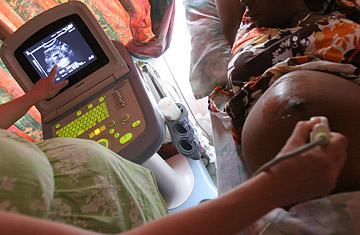
A sonogram is performed on a pregnant patient at a U.S.-funded clinic in White River Junction, South Africa
On the day after the 36th anniversary of the landmark Roe v. Wade Supreme Court decision, President Barack Obama repealed a Reagan-era policy that prohibited foreign nongovernmental family-planning groups from receiving U.S. funds if they provided abortions or even lobbied for abortion rights in their country. It is an action his abortion-rights supporters have waited eight years for and one they had encouraged him to waste no time taking. But by first issuing a statement urging support for common-ground efforts to reduce abortion rates and then waiting to sign the Executive Order late on a Friday afternoon — a time traditionally reserved for the release of information an Administration would like to bury — Obama sent a clear signal that he wants to turn down the heat on an issue that has defined and divided American politics for more than three decades. (See pictures behind the scenes at the Inauguration.)
The Mexico City policy, as it is known, has been one of the most visible differences between the two major political parties on the issue of abortion, in part because incoming Presidents have taken action on it within days of entering the White House. Bill Clinton repealed the policy on Jan. 22, 1993, citing his concern that the ban prevented women and children from receiving health services. Eight years later, George W. Bush reinstated the policy on Jan. 22, 2001. "It is my conviction," Bush said, "that taxpayer funds should not be used to pay for abortions or advocate or actively promote abortion, either here or abroad." (View new fronts in the abortion battle.)
Bush's statement is one being echoed by supporters of the policy today. But in fact, since 1973, federal law has banned the use of U.S. taxpayer funds for abortions in other countries. What the Mexico City policy did was take that prohibition several steps further. Under the policy, NGOs that applied for family-planning funds from the U.S. Agency on International Development (USAID) had to refrain from using any of their own funds to provide abortion (with exceptions for cases of rape or incest or to save the life of the mother). The organizations also were not eligible if they lobbied to make or keep abortion legal in their own country or if they provided abortion referrals — a requirement that led many opponents of the policy to dub it a "global gag rule."
As a result of the policy — which is named for the city in which the Reagan Administration first announced it at the 1984 United Nations International Conference on Population — some groups, including Planned Parenthood organizations in Romania and Colombia, altered their activities in order to qualify and continued to receive funding. But at least 16 developing nations in Africa, Asia and the Middle East have been affected, with all NGOs in those countries denied U.S. funding to help provide contraceptives and other much needed services.
See who's who in Barack Obama's White House.
See pictures of the civil rights movement from Emmett Till to Barack Obama.
